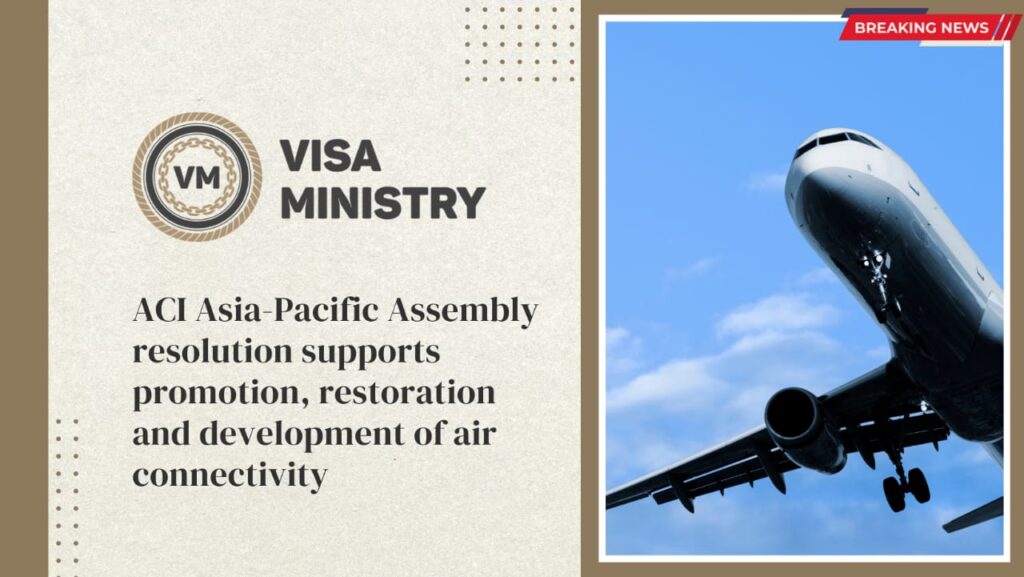The full-scale worldwide COVID-19 transportation crisis has led to a severe decline in Asia-Pacific in terms of direct routes, aircraft frequencies, and seat capacity between 2022 and 2019. Contrarily, airports in the Middle East region, particularly the big international airports, have recovered far more quickly.
JAPAN’S KOBE A trade association representing 622 airports from 47 countries/territories, Airports Council International (ACI) Asia-Pacific, adopted a resolution at its 18th Regional Assembly in Kobe, Japan, to promote, restore, and develop air connectivity in Asia-Pacific and the Middle East in order to ensure social and economic development and to support the United Nations Sustainable Development Goals.
The resolution highlights how crucial it is to completely restore and further enhance air connection in the area, acknowledging the crucial role that airports—driven by effective and reasonably priced air connectivity—can play in fostering social and economic development.
The full-scale worldwide COVID-19 transportation crisis has led to a severe decline in Asia-Pacific in terms of direct routes, aircraft frequencies, and seat capacity between 2022 and 2019. Contrarily, airports in the Middle East region, particularly the big international airports, have recovered far more quickly.
According to the preliminary results of the ACI Asia-Pacific study on airport connectivity, which was carried out with PwC’s help, medium/large airports in the region, which are more heavily dependent on international traffic, will see a 42% reduction in the connectivity index by August 2022, compared to small airports, which benefited from more resilient domestic traffic, which will see a 17% reduction. A 19% rise in connectivity at large/medium airports and a 5% increase at small airports may be found in the Middle East, where airports have recovered significantly more quickly.
The ACI Asia-Pacific Board encourages airport operators to start a new conversation with national authorities and industry stakeholders in order to modernise the aviation sector. The ACI Asia-Pacific Board is aware of the current operating conditions at airports, which are characterised by rising airfares, decreased airline competition and the aviation ecosystem workforce, as well as the significant resources needed to finance the necessary infrastructure modernization.
Given that the aviation industry supports employment, trade, tourism, education, and foreign investments in addition to generating economic value, a comprehensive strategy is needed to foster the growth of the sector.
- Increasing connection through more market liberalisation in international aviation.
- Rethink the strategy for maximising the use of current infrastructure (via slot allocation, a modernised and more flexible charging system) in light of the predicted significant growth and the resulting congestion.
- Funding and finance for airport infrastructure should be encouraged with a respectable return on investment.
- Whenever appropriate, compel countries to simplify and streamline the visa application procedure for overseas visitors.
- Achieving environmental and other sustainability goals, such as lowering CO2 emissions to meet the long-term global aspirational target (LTAG) of net-zero carbon emissions for international aviation by 2050
Mr. Emmanuel Menanteau, President of ACI Asia-Pacific, commented on the resolution and stated that “Connectivity is a crucial facilitator for social and economic success. To help their economies recover, it is crucial to restore air connectivity in the Asia-Pacific region and expand the number of Middle Eastern flights. This resolution emphasises the commitment of the Asia-Pacific and Middle Eastern airport community to collaborate with national and regional authorities in a way that is both economically viable and ecologically sound, in order to benefit both the travellers and the local populations that the airports serve.
The Director General of ACI Asia-Pacific, Mr. Stefano Baronci, stated that “Asia-Pacific is resurrecting after three difficult years. By closely collaborating with institutional and industry partners, modernising the sector entails critically evaluating what may be done differently and better. We urge States to implement a more liberalised market and strengthen cooperation and harmonisation on safety, security, environmental protection, and ATM optimisation in line with the example of the first bloc-to-bloc air transport agreement between the EU and the ASEAN States and the recent summit between India and the EU. It will take strong leadership, a sizable investment, as well as the development of ability and knowledge. ACI Asia-Pacific is eager to contribute at all levels to this process of transformation.
Source: traveldailynews

